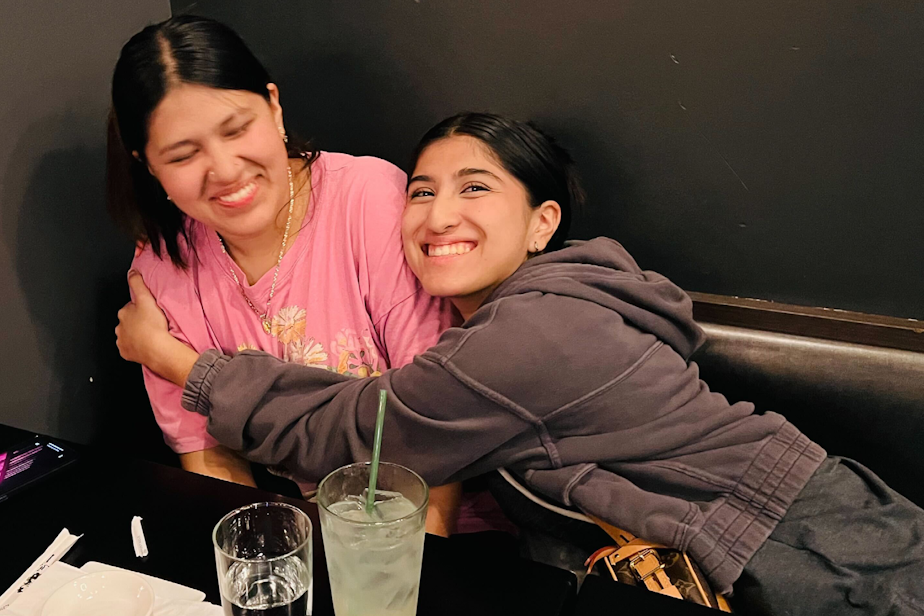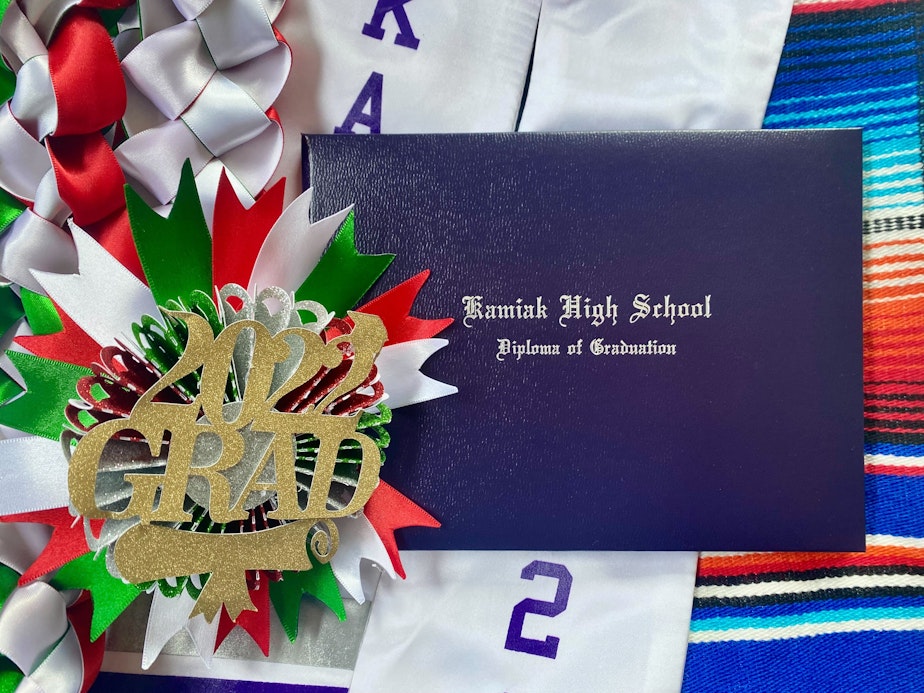How I reconnected to my Mexican roots in a majority-white school

After middle school, RadioActive’s Eva Solorio decided to go to high school in a neighboring city, instead of her local school in Everett, Washington.
She wanted a fresh, new start – but it wasn’t like she imagined.
[RadioActive Youth Media is KUOW's radio journalism and audio storytelling program for young people. This story was entirely youth-produced, from the writing to the audio editing.]
I
grew up going to schools where I felt free to speak Spanish, my native language, anywhere. But it’s not like that anymore.
When I graduated from middle school, I was assigned to go to Mariner High School in Everett, Washington. Mariner was the school all my friends were going to. Like me, the students there are mostly Latino, and most students are part of lower-income households.
But instead, I decided to go to Kamiak High School in Mukilteo, Washington. Kamiak is only about five miles away from Mariner, but the students there are mostly white, and part of higher-income households.
Sponsored
I chose to transfer from Mariner to Kamiak because I wanted a change. I longed for new faces, new friends, and a new atmosphere. And I got that.
But I lost a lot, too. In transferring to a majority-white school, I lost my connection to my Mexican friends and teachers, and to my native language. I lost my sense of belonging.

My sister, Paulina Solorio, and I attended all the same schools until high school, when I decided to go to Kamiak and she decided to go to Mariner.
"I decided to go to Mariner because I did not want to be whitewashed," Paulina said. "I wanted to stay with my culture, and I wanted to be with my friends.”
Sponsored
I never acknowledged the differences between the two high schools until I started going to Kamiak. And that's because it was never something I had to acknowledge. At my previous schools, I was constantly surrounded by my culture and people who I identified with.
But when I got to Kamiak, I was shocked by the culture and class differences I saw. Like when I saw some kids arrive at school driving Teslas and Jeeps, and complaining about how rich the rich are.
Ivan Romero goes to Mariner High School with my sister. He says the difference between the two schools is obvious.
"I'm pretty good friends with a bunch of people that go to Kamiak," Ivan said. "And from the things they tell me, like how their parents are setting them up for [college] scholarships – like, I have conversations with those kids, and then I talk to my Mariner friends who are like, ‘Oh, my dad wants me to take over his construction company.'"
My mom thought that if I went to Kamiak, I would have a better chance of going to college. She thought that I, too, would have problems like looking for college scholarships. But lots of Mariner students have the same value on education as Kamiak students do.
Sponsored
So why do people shed such a bad rep on Mariner?
My sister, Paulina, claims that it's because of the stereotypes imposed on Mariner students by people in the community. She says the stereotype of Mariner kids is that they’re rebellious or rule breakers.
“It makes me feel judged because I attend that school and they view me the same," she said.
But Ivan said that while Mariner does have a few students that fit those stereotypes, every school does. "There's so much more than that here," he said.
And I think he’s exactly right.
Sponsored
Mariner has so much to offer. I look at my friends at Mariner with so much pride and happiness. They have so many cool things at Mariner, like cultural clubs. And I've missed that. I also miss saying hi to my sister in the hallways. Or just being able to go up to someone random at school and have a full-blown conversation in Spanish, and be like, “¿Cómo éstas?”
Even though they’re just a couple of miles apart and in the same school district, the two schools are still different.
There are things I like about Kamiak. But sometimes I wonder what my life would be like if I had gone to Mariner.
Paulina said the main thing she gained from going to Mariner is the memories she has made with people who share her culture.
Sponsored
"I would take all the memories with me," she said. "Because honestly, it's something you can't forget about — because that's your early ages, that's your coming of age. That really made a change in me, being around my friends that are involved in their culture and in their religion as well."
I can’t say that I regret going to Kamiak. I found some amazing people and a music program I love. And being at Kamiak has given me a different appreciation of myself and my culture, even though I lost so much of it going to this school.
Now, I’m considering moving to California in the future to be closer to my family and my culture. When I’m there, I eat the best Mexican food and I love it. I’m reminded of my family that came from Mexico, and it’s an indescribable feeling of honor and admiration.
I’ve realized that being in touch with your culture can help so much in discovering your identity as you grow up.
The memories for me have to be the best part, too.
This story was produced in a RadioActive Youth Media Advanced Producers creative audio workshop for high school and college-age youth. Production assistance by Dayana Capulong and Iz Ortiz. Prepared for the web by Kelsey Kupferer. Edited by Lila Lakehart.
Find RadioActive on Instagram, Twitter, TikTok, YouTube and Facebook, and on the RadioActive podcast.
Support for KUOW's RadioActive comes from the Bill & Melinda Gates Foundation Discovery Center and BECU.
If you have any feedback on this story, you can email RadioActive at radioactive@kuow.org, or click the teal feedback tab on the edge of this page. Reach out, we're listening.



